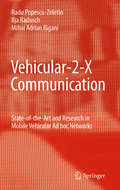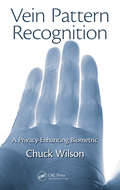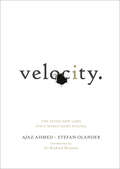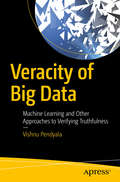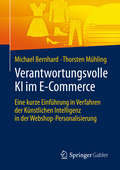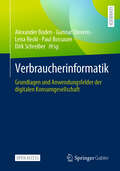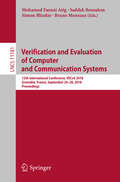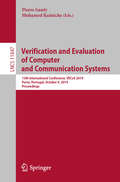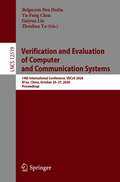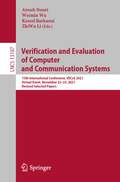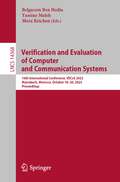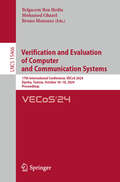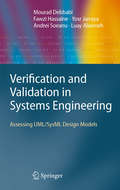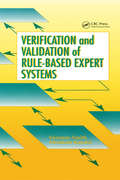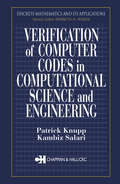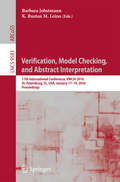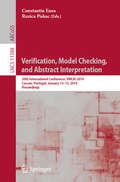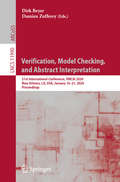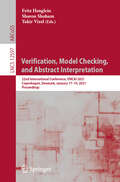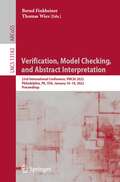- Table View
- List View
Vehicular-2-X Communication
by Radu Popescu-Zeletin Ilja Radusch Mihai Adrian RiganiThe European Car-to-Car Communication Consortium in relation with the American Vehicle Safety Communication project has been playing a key role in the development of the concepts and technologies which are now at the origin of the standardization activities and research projects (PREVENT, SAFESPOT, CVIS) being introduced. Many safety applications (some of them being summarized here) will use this standard infrastructure for contributing to a safer road environment. Along the ISO OSI reference model the authors describe medium access control, routing in WAVE/DSRC (Dedicated Short Range Communications), 802.11p, and accompanying standards based on the communication architecture defined by the Car-to-Car Communication Consortium and the National Vehicle Infrastructure Integration Consortium (VIIC), as within the Federal ITS Program (RITA). Furthermore, this book introduces and describes future automotive applications such as cooperative driving utilizing such car-2-X (or vehicle-2-x) communication between vehicles and road infrastructure. Validation of these novel applications is a must before market introduction. Therefore this book introduces comprehensive simulation environment combining existing approaches for application, traffic and network simulation.
Vein Pattern Recognition: A Privacy-Enhancing Biometric
by Chuck WilsonAs one of the most promising biometric technologies, vein pattern recognition (VPR) is quickly taking root around the world and may soon dominate applications where people focus is key. Among the reasons for VPR‘s growing acceptance and use: it is more accurate than many other biometric methods, it offers greater resistance to spoofing, it focuses
Velocity: The Seven New Laws for a World Gone Digital
by Ajaz Ahmed Stefan OlanderHow can you win when the only certainty is change? Highly accessible, lively and inspiring, Velocity draws upon the authors’ unique perspectives and experiences to present seven timeless new laws for businesses and individuals in a world that is dominated by rapid change and digital technology. Written as a fascinating and enjoyable conversation between the authors – Stefan Olander, Vice President of Digital Sport from Nike and Ajaz Ahmed founder and Chairman AKQA – Velocity's up-to-date examples illustrate key lessons, together with insights, ideas and inspiration that individuals and businesses should adopt to thrive in the digital age. Velocity shares the vision and values required to succeed with the untold backstories to influential and iconic innovation. Fast paced, useful, provocative and highly motivating, Velocity is a management book that will arm you with actionable ideas to define your future. Features: - 4 Velocity principles: Speed, Direction, Acceleration, Discipline. - 7 Laws, including 'A Smith & Wesson beats four aces', 'It’s easier done than said', 'Convenient is the enemy of right' and 'No good joke survives a committee of six'.
Vender En Internet - Cómo Ganar Dinero Vendiendo En Ebay, Amazon, Fiverr Y Etsy
by Nick Vulich Mariana BarrancosVender en Internet es su guía, paso a paso, para triunfar en el comercio electrónico. Este libro le presentará los cuatro grandes sitios: eBay, Amazon, Fiverr y Etsy.***** Una nueva versión revisada y actualizada al 2014. Incluye 200 páginas de nuevos contenidos, con secciones sobre cómo tener un blog, cursos y programas de entrenamiento y capacitación, cómo construir un tablón de empleos local y cómo escribir y vender libros en Kindle*****¿Quiere aprender a vender en Internet?Vender en Internet es su guía, paso a paso, para triunfar en el comercio electrónico. Este libro le presentará los cuatro grandes sitios: eBay, Amazon, Fiverr y Etsy. El autor, Nick Vulich, ha completado más de 29,000 transacciones en eBay, en los últimos catorce años. Conoce todos los pormenores acerca de vender en eBay, Amazon y Fiverr, y le ofrece llevarlo de la mano en un recorrido por todos los pasos que necesitará para aprender a vender en Internet. ¿Es nuevo en el comercio electrónico? ¿Tiene dificultades tratando de decidir por dónde comenzar?No se preocupe. Este libro lo guiará a través de todo lo que necesita saber para comenzar a vender en Internet, hoy. Todos soñamos con ganar dinero en Internet.¿Quién no quiere tener un trabajo que le permita trabajar desde su casa, en piyamas o ropa interior? ¿Un trabajo sin jefes, persiguiéndolo y diciéndole qué debe hacer, cómo debe hacerlo o para cuándo y qué tan rápido? Vender en línea puede ser esto y mucho más. Contrariamente a la creencia popular, no es fácil. No. Quizás no tendrá un jefe persiguiéndolo para que haga su trabajo, pero se encontrará trabajando mucho más de lo que alguna vez trabajó en un empleo común. Se encontrará con que cuenta con muy poco dinero, especialmente si recién comienza. Sólo porque decida publicar sus tejas en eBay o Amazon, o cualquier otro sitio
Vendere Online - Come Guadagnare Vendendo Su Ebay, Amazon, Fiverr & Etsy
by Eugenia Franzoni Nick VulichVendere online è la vostra guida passo-passo per avere successo nell'ecommerce. Questo libro vi introdurrà ai principali quattro portali di e-commerce: eBay, Amazon, Fiverr ed Etsy.***** Versione aggiornata e rivista per il 2014, include 78 pagine di nuovi contenuti, comprese sezioni sui blog e su come scrivere e vendere libri Kindle.*****Volete imparare come vendere online?L'autore, Nick Vulich, ha completato oltre 29000 transazioni su eBay negli ultimi quattordici anni; conosce le vendite su eBay, Amazon e Fiverr e vi sta offrendo la sua mano per guidarvi attraverso tutto il procedimento. Siete nuovi nell'e-commerce? Avete difficoltà o state cercando di capire come iniziare?Non vi preoccupate. Questo libro vi guiderà attraverso tutto quello che dovete sapere per iniziare a vendere online oggi.Tutti sognano di fare soldi online.Chi non vorrebbe un lavoro in cui si possa lavorare a casa in pigiama o in mutande? Un lavoro in cui non c'è un capo che ti sta alle spalle e ti dice cosa fare, come farlo e con quali tempistiche?Vendere online può realizzare questo sogno, e molto di più.Al contrario di quanto si pensi, non è facile. Non lo è affatto. Non avrete un capo che vi infastidisce dicendovi cosa fare, ma vi ritroverete a lavorare molto più duramente di quanto abbiate mai fatto nel vostro attuale lavoro.Vi potrete ritrovare in bolletta, specialmente all'inizio.Solo perché decidete di aprire un negozio su eBay, Amazon o su un qualsiasi altro negozio online non vuol dire che i clienti arriveranno magicamente a comprare da voi e vi ricopriranno di soldi. Come in tutte le cose, per avere successo nel vendere prodotti o servizi ci vuole tempo.Chiunque può andare online, pubblicare un elenco di articoli e fare un paio di vendite veloci, ma diventare un venditore di successo vuol dire replicare questo processo giorno dopo giorno e mese dopo mese.
Veracity of Big Data: Machine Learning and Other Approaches to Verifying Truthfulness
by Vishnu PendyalaExamine the problem of maintaining the quality of big data and discover novel solutions. You will learn the four V’s of big data, including veracity, and study the problem from various angles. The solutions discussed are drawn from diverse areas of engineering and math, including machine learning, statistics, formal methods, and the Blockchain technology. Veracity of Big Data serves as an introduction to machine learning algorithms and diverse techniques such as the Kalman filter, SPRT, CUSUM, fuzzy logic, and Blockchain, showing how they can be used to solve problems in the veracity domain. Using examples, the math behind the techniques is explained in easy-to-understand language.Determining the truth of big data in real-world applications involves using various tools to analyze the available information. This book delves into some of the techniques that can be used. Microblogging websites such as Twitter have played a major role in public life, including during presidential elections. The book uses examples of microblogs posted on a particular topic to demonstrate how veracity can be examined and established. Some of the techniques are described in the context of detecting veiled attacks on microblogging websites to influence public opinion.What You'll LearnUnderstand the problem concerning data veracity and its ramificationsDevelop the mathematical foundation needed to help minimize the impact of the problem using easy-to-understand language and examplesUse diverse tools and techniques such as machine learning algorithms, Blockchain, and the Kalman filter to address veracity issuesWho This Book Is ForSoftware developers and practitioners, practicing engineers, curious managers, graduate students, and research scholars
Verantwortungsvolle KI im E-Commerce: Eine kurze Einführung in Verfahren der Künstlichen Intelligenz in der Webshop-Personalisierung
by Michael Bernhard Thorsten MühlingDieses Buch zeigt, wie Verfahren aus der Künstlichen Intelligenz in digitalen Verkaufsprozessen eingesetzt werden können, um dadurch die Personalisierung im Webshop zu verbessern und den Umsatz zu erhöhen. Die Autoren erläutern dies mit leicht verständlichen Texten und anschaulichen Bildern. Sie sensibilisieren zugleich für einen verantwortungsvollen Umgang mit den von der KI-generierten Daten. Ganz ohne mathematische Formeln bringen sie Ordnung in das Begriffs-Wirrwarr der verschiedenen KI-Verfahren, stellen die verschiedenen Ansätze verständlich dar und bringen sie schlüssig in die jeweiligen Zusammenhänge im E-Commerce. So geben sie eine Grundorientierung, um Künstliche-Intelligenz-Themen besser einordnen, beurteilen und anwenden zu können.Zielgruppe sind E-Commerce-Manager, die ihre Webshops mit Künstlicher Intelligenz optimieren wollen und dabei das Thema Daten auch kritisch hinterfragen und reflektieren.Aus dem Inhalt Die Grundlagen der Künstlichen Intelligenz einfach erklärtSelbstlernende Algorithmen: Künstliche neuronale Netze, Reinforcement Learning, Deep LearningWas beeinflusst die Güte eines Prognose-Modells?Welche Daten braucht Personalisierung?KI-Methoden und Datenmanagement im Einsatz für die PersonalisierungWas kommt noch? Trends in der Künstlichen Intelligenz KI und ihre Nebenwirkungen: Was macht das Ganze mit uns als Menschen?
Verbraucherinformatik: Grundlagen und Anwendungsfelder der digitalen Konsumgesellschaft
by Dirk Schreiber Alexander Boden Paul Bossauer Gunnar Stevens Lena ReckiIn einer Zeit, in der digitale Technologien nahezu jeden Aspekt unseres Lebens durchdringen, ist es unerlässlich, die tieferen Zusammenhänge des digitalen Konsums zu verstehen. Erstmalig bietet dieses open access-Lehrbuch einen Wegweiser durch die vielfältigen Facetten der Digitalisierung des Konsums. Dabei verbindet es die Disziplinen der angewandten Informatik und Verbraucherwissenschaften. Die Leserinnen und Leser erhalten Einblick in die digitale Konsumlandschaft, ausgehend von der historischen Entwicklung des (digitalen) Konsums. Dazu vermittelt das Lehrbuch zentrale Grundbegriffe und Themen der Verbraucherinformatik und stellt verschiedene Konsumtheorien aus den Disziplinen Wirtschaftswissenschaften, Psychologie und Sozialwissenschaften vor. Praxisnahe Beispiele aus der Digitalisierung bieten Einsichten in unterschiedliche Perspektiven, während vertiefende Textboxen und Selbstreflexionsfragen das Verständnis fördern. Inhaltlich decken die Autorinnen und Autoren Themen von Datenschutz bis zur Sharing Economy ab und geben insbesondere auch praktische Ansätze für Themen wie Verbraucherschutz und Nachhaltigkeit mit auf den Weg. Die Anwendungs- und Querschnittsthemen der Verbraucherinformatik reichen von der Digitalisierung der Haushalte und Märkte über Fragen des digitalen Verbraucherschutzes bis hin zu zentralen gesellschaftlichen Fragestellungen rund um die Themen Fairness, Verantwortung und Nachhaltigkeit bei der Gestaltung von digitalen Technologien. Das Buch bietet einen umfassenden Überblick, der sowohl für Studierende der Wirtschafts- und Sozialwissenschaften als auch der angewandten Informatik von bedeutendem Wert ist.
Verbraucherschutz im E-Commerce: Rechtliche Rahmenbedingungen für den Warenverkauf im Internet (essentials)
by Sascha StieglerPrivatpersonen bestellen heutzutage eine Vielzahl von Waren und Konsumgüter im oder über das Internet. Aufgrund der physischen Abwesenheit der Beteiligten im Internet stellen sich im entsprechenden E-Commerce jedoch unweigerlich besondere, vom stationären Handel abweichende Rechtsfragen. Diese sind dabei regelmäßig eng mit der gesetzgeberischen Intention eines umfassenden Verbraucherschutzes verknüpft. Das E-Commerce-Recht hat in diesem Zusammenhang in den letzten Jahren sowohl auf deutscher als auch europäischer Ebene eine umfassende Regulierung erfahren. Dieses essential gibt daher einen Einblick in die Grundlagen der verbraucherschützenden Regularien des E-Commerce und gibt Unternehmern Hinweise zur rechtskonformen Ausgestaltung ihres Online-Shops.
Verdiene passives Einkommen mit Quora und hänge deinen Job an den Nagel: Wie Du online eine Million verdienen kannst
by Marcus PfeifferDass Du Dich für dieses Buch interessierst zeigt mir, dass Du nach Möglichkeiten Ausschau hältst um online Geld zu verdienen. Glaub mir, vor ein paar Jahren war ich genau dort, wo Du jetzt bist. Ich habe in jeder Ecke des weltweiten Webs nach einer Möglichkeit gesucht um geld zu verdienen. Ich habe aber keinen einzigen Cent verdient. Leider ganz im Gegenteil, ich habe unzählige Summen an Geld verloren, sei es für Kurse, Werbung, Webseiten, Bücher oder falsches Investieren. Glücklicherweise kam ich eines Tages über eine Methode, welche es mir ermöglichte ein passives Einkommen zu generieren. Versteh mich bitte nicht falsch, passiv bedeutet nicht, dass Du nichts machen musst um Geld zu verdienen. Es bedeutet nur, dass wenn du einmal die harte Arbeit hereingesteckt hast, dass dann das Geld fliesst, ohne dass Du aktiv bzw. sehr aktiv sein musst. Bis du aber diesen Level erreichst, wenn das Geld einfach fliesst, musst du sehr hart arbeiten, und du musst sehr viel dieser harten Arbeit verrichten. In diesem Buch werde ich dir die Methode zeigen, die ich verwendete um ein vermögen zu machen. Ich verspreche Dir, wenn Du hart genug arbeitest wirst Du schon in sehr kurzer Zeit ein siebenstelliges Einkommen haben.
Verification and Evaluation of Computer and Communication Systems: 12th International Conference, VECoS 2018, Grenoble, France, September 26–28, 2018, Proceedings (Lecture Notes in Computer Science #11181)
by Mohamed Faouzi Atig Saddek Bensalem Simon Bliudze Bruno MonsuezThis book constitutes the proceedings of the 12th International Conference on Verification and Evaluation of Computer and Communication Systems ( VECoS 2018) held at Grenoble, France, in September 2018. The 11 full papers in this volume, presented together with one abstract and two invited papers, were carefully reviewed and selected from 23 submissions. The aim of the VECoS conference is to bring together researchers and practitioners in the areas of verification, control, performance, and dependability evaluation in order to discuss state of the art and challenges in modern computer and communication systems in which functional and extra-functional properties are strongly interrelated. Thus, the main motivation for VECoS is to encourage the cross-fertilization between various formal verification and evaluation approaches, methods and techniques, and especially those developed for concurrent and distributed hardware/software systems.
Verification and Evaluation of Computer and Communication Systems: 13th International Conference, VECoS 2019, Porto, Portugal, October 9, 2019, Proceedings (Lecture Notes in Computer Science #11847)
by Pierre Ganty Mohamed KaânicheThis book constitutes the proceedings of the 13th International Conference on Verification and Evaluation of Computer and Communication Systems ( VECoS 2019), held in Porto, Portugal, in October 2019. The 7 full papers in this volume, presented together with two invited talks, were carefully reviewed and selected from 13 submissions. The aim of the VECoS conference is to bring together researchers and practitioners in the areas of verification, control, performance, and dependability evaluation in order to discuss state of the art and challenges in modern computer and communication systems in which functional and extra-functional properties are strongly interrelated. Thus, the main motivation for VECoS is to encourage the cross-fertilization between various formal verification and evaluation approaches, methods and techniques, and especially those developed for concurrent and distributed hardware/software systems.
Verification and Evaluation of Computer and Communication Systems: 14th International Conference, VECoS 2020, Xi'an, China, October 26–27, 2020, Proceedings (Lecture Notes in Computer Science #12519)
by Yu-Fang Chen Belgacem Ben Hedia Gaiyun Liu Zhenhua YuThis book constitutes the proceedings of the 14th International Conference on Verification and Evaluation of Computer and Communication Systems, VECoS 2020, which was supposed to be held in Xi’an, China, in October 2020, but was held virtually instead. The 19 full papers and 1 short paper presented in this volume were carefully reviewed and selected from 60 submissions. The aim of the VECoS conference is to bring together researchers and practitioners in the areas of verification, control, performance, and dependability evaluation in order to discuss state of the art and challenges in modern computer and communication systems in which functional and extra-functional properties are strongly interrelated. Thus, the main motivation for VECoS is to encourage the cross-fertilization between various formal verification and evaluation approaches, methods and techniques, and especially those developed for concurrent and distributed hardware/software systems. The papers are organized in the following topical sections: petri-net, simulation, and scheduling; formal modeling and verification, testing; and artificial intelligence and machine learning.
Verification and Evaluation of Computer and Communication Systems: 15th International Conference, VECoS 2021, Virtual Event, November 22–23, 2021, Revised Selected Papers (Lecture Notes in Computer Science #13187)
by Kamel Barkaoui ZhiWu Li Ayoub Nouri Weimin WuThis book constitutes the proceedings of the 15th International Conference on Verification and Evaluation of Computer and Communication Systems, VECoS 2021, which took place in November 2021. Due to COVID-19 pandemic the conference was held virtually. The 5 full papers presented in this volume were carefully reviewed and selected from 12 submissions. The aim of the VECoS conference is to bring together researchers and practitioners in the areas of verification, control, performance, and dependability evaluation in order to discuss state of the art and challenges in modern computer and communication systems in which functional and extra-functional properties are strongly interrelated. Thus, the main motivation for VECoS is to encourage the cross-fertilization between various formal verification and evaluation approaches, methods and techniques, and especially those developed for concurrent and distributed hardware/software systems.
Verification and Evaluation of Computer and Communication Systems: 16th International Conference, VECoS 2023, Marrakech, Morocco, October 18–20, 2023, Proceedings (Lecture Notes in Computer Science #14368)
by Yassine Maleh Belgacem Ben Hedia Moez KrichenThis book constitutes the refereed proceedings of the 16th International Conference on Verification and Evaluation of Computer and Communication Systems, VECoS 2023, held in Marrakech, Morocco, during October 18–20, 2023. The 12 full papers included in this book were carefully reviewed and selected from 36 submissions. The topics presented covered a range of subjects, including approaches to improving the scalability and efficiency of formal verification and their applications to blockchain, smart contracts and neural networks.
Verification and Evaluation of Computer and Communication Systems: 17th International Conference, VECoS 2024, Djerba, Tunisia, October 16–18, 2024, Proceedings (Lecture Notes in Computer Science #15466)
by Bruno Monsuez Belgacem Ben Hedia Mohamed GhazelThis book constitutes the refereed proceedings of the 17th International Conference on Verification and Evaluation of Computer and Communication Systems, VECoS 2024, held in Djerba, Tunisia, during October 16–18, 2024. The 16 full papers included in this book were carefully reviewed and selected from 42 submissions. They deal with the state of the art and challenges in modern computer and communication systems in the areas of verification, control, performance, and dependability evaluation.
Verification and Validation in Scientific Computing
by William L. Oberkampf Christopher J. RoyAdvances in scientific computing have made modelling and simulation an important part of the decision-making process in engineering, science, and public policy. This book provides a comprehensive and systematic development of the basic concepts, principles, and procedures for verification and validation of models and simulations. The emphasis is placed on models that are described by partial differential and integral equations and the simulations that result from their numerical solution. The methods described can be applied to a wide range of technical fields, from the physical sciences, engineering and technology and industry, through to environmental regulations and safety, product and plant safety, financial investing, and governmental regulations. This book will be genuinely welcomed by researchers, practitioners, and decision makers in a broad range of fields, who seek to improve the credibility and reliability of simulation results. It will also be appropriate either for university courses or for independent study.
Verification and Validation in Systems Engineering: Assessing UML/SysML Design Models
by Yosr Jarraya Luay Alawneh Andrei Soeanu Fawzi Hassaïne Mourad DebbabiVerification and validation represents an important process used for the quality assessment of engineered systems and their compliance with the requirements established at the beginning of or during the development cycle. Debbabi and his coauthors investigate methodologies and techniques that can be employed for the automatic verification and validation of systems engineering design models expressed in standardized modeling languages. Their presentation includes a bird's eye view of the most prominent modeling languages for software and systems engineering, namely the Unified Modeling Language (UML) and the more recent Systems Modeling Language (SysML). Moreover, it elaborates on a number of quantitative and qualitative techniques that synergistically combine automatic verification techniques, program analysis, and software engineering quantitative methods applicable to design models described in these modeling languages. Each of these techniques is additionally explained using a case study highlighting the process, its results, and resulting changes in the system design. Researchers in academia and industry as well as students specializing in software and systems engineering will find here an overview of state-of-the-art validation and verification techniques. Due to their close association with the UML standard, the presented approaches are also applicable to industrial software development.
Verification and Validation of Rule-Based Expert Systems
by Abraham Kandel Suzanne SmithThis book presents an innovative approach to verifying and validating rule-based expert systems. It features a complete set of techniques and tools that provide a more formal, objective, and automated means of carrying out verification and validation procedures. Many of the concepts behind these procedures have been adapted from conventional software, while others have required that new techniques or tools be created because of the uniqueness of rule-based expert systems. Verification and Validation of Rule-Based Expert Systems is a valuable reference for electrical engineers, software engineers, artificial intelligence experts, and computer scientists involved with object-oriented development, expert systems, and programming languages.
Verification of Computer Codes in Computational Science and Engineering (Discrete Mathematics and Its Applications)
by Patrick Knupp Kambiz SalariHow can one be assured that computer codes that solve differential equations are correct? Standard practice using benchmark testing no longer provides full coverage because today's production codes solve more complex equations using more powerful algorithms. By verifying the order-of-accuracy of the numerical algorithm implemented in the code, one can detect most any coding mistake that would prevent correct solutions from being computed.Verification of Computer Codes in Computational Science and Engineering sets forth a powerful alternative called OVMSP: Order-Verification via the Manufactured Solution Procedure. This procedure has two primary components: using the Method of Manufactured Exact Solutions to create analytic solutions to the fully-general differential equations solved by the code and using grid convergence studies to confirm the order-of-accuracy. The authors present a step-by-step procedural guide to OVMSP implementation and demonstrate its effectiveness.Properly implemented, OVMSP offers an exciting opportunity to identify virtually all coding 'bugs' that prevent correct solution of the governing partial differential equations. Verification of Computer Codes in Computational Science and Engineering shows you how this can be done. The treatment is clear, concise, and suitable both for developers of production quality simulation software and as a reference for computational science and engineering professionals.
Verification, Model Checking, and Abstract Interpretation
by Barbara Jobstmann K. Rustan M. LeinoThis book constitutes the refereed proceedings of the 17th International Conference on Verification, Model Checking, and Abstract Interpretation, VMCAI 2016, held in St. Petersburg, FL, USA, in January 2016. The 24 full papers together with 2 invited talks and 1 abstract presented were carefully reviewed and selected from 67 submissions. VMCAI provides topics including: program verification, model checking, abstract interpretation and abstract domains, program synthesis, static analysis, type systems, deductive methods, program certification, debugging techniques, program transformation, optimization, hybrid and cyber-physical systems.
Verification, Model Checking, and Abstract Interpretation: 20th International Conference, VMCAI 2019, Cascais, Portugal, January 13–15, 2019, Proceedings (Lecture Notes in Computer Science #11388)
by Ruzica Piskac Constantin EneaThis book constitutes the refereed proceedings of the 20th International Conference on Verification, Model Checking, and Abstract Interpretation, VMCAI 2019, held in Cascais, Portugal, in January 2019.The 27 full papers presented together with the abstracts of 3 invited keynote talks were carefully reviewed and selected from 62 submissions. VMCAI provides topics including: program verification, model checking, abstract interpretation, program synthesis, static analysis, type systems, deductive methods, program certification, decision procedures, theorem proving, program certification, debugging techniques, program transformation, optimization, and hybrid and cyber-physical systems.
Verification, Model Checking, and Abstract Interpretation: 21st International Conference, VMCAI 2020, New Orleans, LA, USA, January 16–21, 2020, Proceedings (Lecture Notes in Computer Science #11990)
by Dirk Beyer Damien ZuffereyThis book constitutes the proceedings of the 21st International Conference on Verification, Model Checking, and Abstract Interpretation, VMCAI 2020. The 21 papers presented in this volume were carefully reviewed from 44 submissions. VMCAI provides a forum for researchers from the communities of verification, model checking, and abstract Interpretation, facilitating interaction, cross-fertilization, and advancement of hybrid methods that combine these and related areas.
Verification, Model Checking, and Abstract Interpretation: 22nd International Conference, VMCAI 2021, Copenhagen, Denmark, January 17–19, 2021, Proceedings (Lecture Notes in Computer Science #12597)
by Fritz Henglein Sharon Shoham Yakir VizelThis book constitutes the proceedings of the 22nd International Conference on Verification, Model Checking, and Abstract Interpretation, VMCAI 2021, which was held virtually during January 17-19, 2021. The conference was planned to take place in Copenhagen, Denmark, but changed to an online event due to the COVID-19 pandemic. The 23 papers presented in this volume were carefully reviewed from 48 submissions. VMCAI provides a forum for researchers working on verification, model checking, and abstract interpretation and facilitates interaction, cross-fertilization, and advancement of hybrid methods that combine these and related areas. The papers presented in this volume were organized in the following topical sections: hyperproperties and infinite-state systems; concurrent and distributed systems; checking; synthesis and repair; applications; and decision procedures.
Verification, Model Checking, and Abstract Interpretation: 23rd International Conference, VMCAI 2022, Philadelphia, PA, USA, January 16–18, 2022, Proceedings (Lecture Notes in Computer Science #13182)
by Bernd Finkbeiner Thomas WiesThis book constitutes the proceedings of the 23rd International Conference on Verification, Model Checking, and Abstract Interpretation, VMCAI 2022, which took place in Philadelphia, PA, USA, in January 2022.The 22 papers presented in this volume were carefully reviewed from 48 submissions. VMCAI provides a forum for researchers working on verification, model checking, and abstract interpretation and facilitates interaction, cross-fertilization, and advancement of hybrid methods that combine these and related areas.
